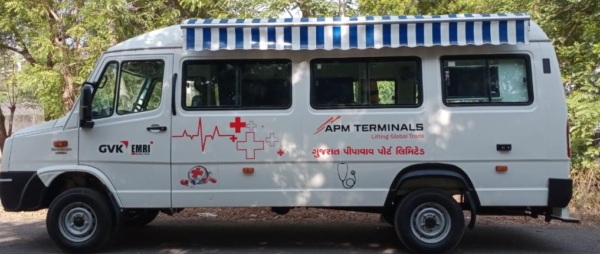Pipavav, Gujarat – July 7, 2025: APM Terminals Pipavav has positively impacted the lives of over 1 lakh people and 50,000 livestock across 400+ villages, in one of Gujarat’s most extensive rural development efforts. Over the past ten years, the company’s CSR initiatives—spanning education, healthcare, environmental sustainability, natural resource management, sustainable fisheries, skill development, women’s empowerment, and disaster relief—have significantly improved the quality of life and strengthened local capacities in underserved communities. These initiatives align with the United Nations Sustainable Development Goals (SDGs), reinforcing the company’s commitment to inclusive and sustainable development.

In the field of education, over 8,000 students have benefitted from digital classrooms, learning resource centres, summer camps, and experiential science and maths learning through the Mobile Science and Maths Lab. As a result, primary school enrolment has reached 100%, higher secondary enrolment has risen from 80% to 93%, and secondary school pass rates have improved from 61% to 85%.
Healthcare services have also seen a major transformation. More than 2,000 villagers, drivers, migrant labors receive monthly OPD care via a Mobile Health Unit and the Port Medical Centre. Emergency services are available round the clock through an Advanced Life Support Ambulance and a Boat Ambulance. Eye health camps have reached 9,492 individuals, including 2,283 cataract surgeries. Water security initiatives—including 23 check dams, over 300 rainwater recharge/storage units, and more than 2 lakh trees planted—have helped reduce TDS levels from 1,613 ppm to 931 ppm, improving both health and agricultural outcomes. Alongside this, livestock across 45 villages are served by a mobile veterinary clinic and village-level health camps, treating over 50,000 animals to date.
To foster sustainable livelihoods, APM Terminals Pipavav established a Skill and Entrepreneurship Development Institute (SEDI) and two sub-centres of SEDI for women. These centres have trained 3,145 youth, achieving an 81% placement rate, while over 2,000 women have been equipped with skills in tailoring, diamond polishing, and other vocations. The formation of 47 self-help groups and the Utkantha Mahila Producer Company—with more than 250 women shareholders—has further strengthened economic independence and created new income opportunities for women.
Flagship initiatives like Project Harit and Project Pashu Uday have driven a 53% rise in farm incomes and a 79% increase in livestock-based earnings, as noted in an impact assessment by MGLI (2023). The report further commended the company for its innovative and inclusive programs aimed at uplifting vulnerable groups and deprived areas. The creation of fisheries and farmer producer companies, with over 2,500 members, has empowered rural communities through collective bargaining and market access. Rural infrastructure development has also been a priority, with investments in market sheds, roads, solar-powered lighting, and cold-storage facility for fishermen.
In times of crisis, APM Terminals Pipavav has played a vital role as a frontline responder. During the COVID-19 pandemic, the company provided 45 oxygen concentrators, 25 cylinders, 500 vaccine units, and over 1.5 lakh masks, and established an isolation centre at Rampara. In the aftermath of Cyclone Tauktae, the company supported relief operations by distributing roofing sheets, kitchen kits, and repair materials. During the Lumpy Skin Disease outbreak, livestock across 45 villages were promptly vaccinated.
Since 2014, the company’s CSR strategy has evolved from individual projects into a comprehensive, integrated rural development model. By aligning education, healthcare, skill development, water conservation, women’s empowerment, and disaster response, APM Terminals Pipavav is fostering sustainable and self-reliant communities. The outcomes—improved school performance, cleaner water, higher incomes, and empowered women—reflect the company’s deep-rooted partnership with the people it serves and its ongoing commitment to meaningful, systemic change.
